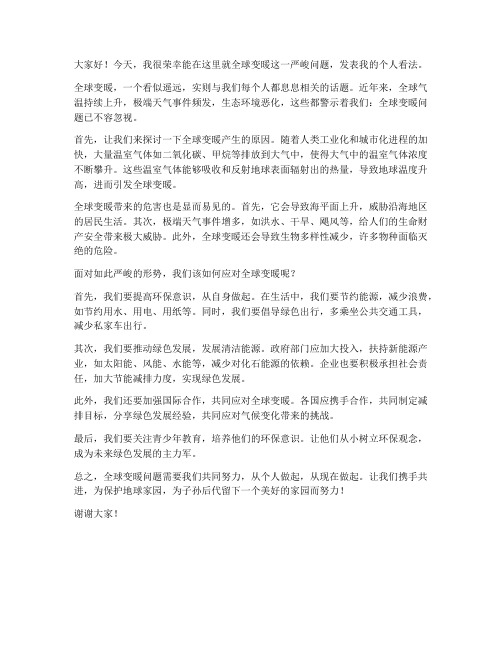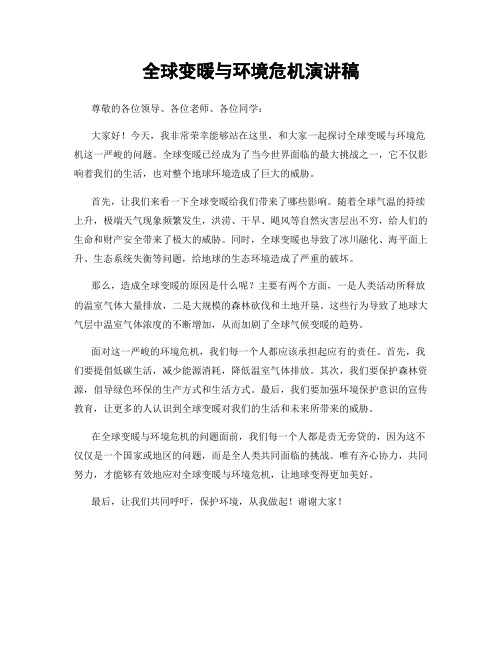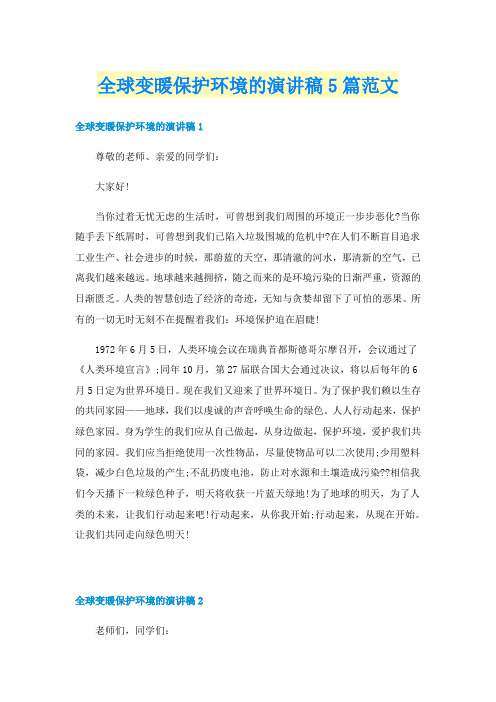以全球变暖问主题的演讲稿
全球变暖的解决方案演讲稿

全球变暖的解决方案演讲稿
尊敬的各位领导、各位来宾,大家好!
今天,我很荣幸能有机会和大家一起探讨全球变暖这个重要的议题。
全球变暖
已经成为了我们面临的严峻挑战,它不仅影响着我们的生活,也对整个地球生态系统产生了深远的影响。
然而,面对这一挑战,我们不能束手无策,我们需要积极采取行动来解决这个问题。
首先,我们需要采取措施减少温室气体排放。
温室气体是导致全球变暖的主要
原因之一,因此减少温室气体的排放是解决全球变暖问题的关键。
我们可以通过提倡低碳生活方式,推广清洁能源,加强工业排放的管控等方式来减少温室气体的排放,从而降低全球变暖的程度。
其次,我们需要加强全球合作,共同应对全球变暖。
全球变暖是一个全球性的
问题,需要各国共同努力来解决。
我们可以通过国际合作协议,共同制定减排目标和措施,共享清洁技术和经验,共同应对气候变化带来的挑战,从而实现全球变暖问题的有效治理。
此外,我们还需要加强环境保护意识,推动社会各界参与全球变暖问题的解决。
只有当每个人都意识到全球变暖对我们的生活和地球的影响时,才能真正做到从我做起,从身边做起,积极参与到全球变暖问题的解决中。
在未来的道路上,我们需要更加积极地采取行动,共同努力,才能够实现全球
变暖问题的解决。
让我们携起手来,共同为地球的未来努力奋斗吧!
谢谢大家!。
全球变暖科学演讲稿范文

大家好!今天,我站在这里,与大家共同探讨一个关乎人类未来生存和发展的重要议题——全球变暖。
首先,让我们回顾一下全球变暖的定义。
全球变暖是指地球表面平均气温的持续上升,这一现象主要由人类活动导致的大气中温室气体浓度增加所引起。
近年来,全球变暖问题日益严重,已成为国际社会关注的焦点。
首先,全球变暖对气候系统的影响不容忽视。
据科学家们的研究,全球变暖导致极端天气事件频发,如干旱、洪水、台风等。
这些灾害不仅对人类生活造成极大影响,还威胁到地球生态系统的平衡。
其次,全球变暖对海平面上升的影响也令人担忧。
随着全球气温升高,两极冰川融化速度加快,导致海平面上升。
据预测,如果全球气温继续上升,未来几十年内,海平面上升将给沿海地区带来严重威胁,甚至导致部分城市被淹没。
此外,全球变暖还对生物多样性产生严重影响。
气候变化导致物种分布发生变化,许多物种面临生存危机。
据研究,全球变暖可能导致全球1/4的物种灭绝。
面对如此严峻的形势,我们应如何应对全球变暖呢?首先,加强国际合作。
全球变暖是全球性问题,需要各国共同努力。
我国政府积极参与国际气候谈判,推动全球气候治理。
其次,调整能源结构。
减少对化石能源的依赖,大力发展可再生能源,如风能、太阳能、水能等,降低温室气体排放。
再次,提高能源利用效率。
通过技术创新,提高能源利用效率,降低能源消耗。
最后,加强环保教育。
提高全民环保意识,倡导绿色生活方式,减少对环境的破坏。
总之,全球变暖问题刻不容缓。
让我们携手共进,为应对全球变暖、保护地球家园而努力!在此,我提出以下几点建议:1. 政府应加大政策支持力度,鼓励企业、科研机构开展低碳技术研发。
2. 企业应积极履行社会责任,减少碳排放,实现绿色发展。
3. 公民应树立环保意识,倡导低碳生活,为地球家园贡献力量。
让我们共同努力,为构建美丽中国、美丽世界而奋斗!谢谢大家!。
全球变暖的演讲 环保的演讲稿800字5篇例文

全球变暖的演讲环保的演讲稿800字5篇例文篇一寒冷的冬天过去了,可今年冬天连一场雪也没下,天气也不怎么冷,为什么会这样呢?我问了妈妈,妈妈说:“我也不太清楚,你去网上查查吧。
”我打开电脑,输入——为什么全球气候变暖。
版面上出现了许许多多的答案。
因为人类毁坏森林并将其焚烧时产生的多种温室气体,由于这些温室气体对来自太阳辐射的可见光具有高度透过性,而对地球反射出来的具有高度的吸收性,能强烈吸收地面辐射中的红外线,也就是常说的“温室效应”。
导致气候变暖的后果,会使全球降水量重新分配,冰川和冻土消融,海平面上升等,危害自然生态系统的平衡,人类的食物供应和居住坏境。
全球变暖不仅危害了人类,而且还危害到动物的生存。
比如说北极熊吧,因为全球变暖,冰川融化,北极熊捕食鱼类更困难,而且冰川急速融化,这样下去,北极熊这个物种早晚会灭绝的,跟北极熊一样的动物还有:北极狼,北极狐,企鹅。
想要阻止全球变暖,我们应该节约每一滴水;多种植数木减少沙化;不要再用一次性方便袋;减少二氧化碳的排放。
我呼吁:为了我们的家园,我们一起行动吧!全球变暖的演讲篇二尊敬的老师们,亲爱的同学们:大家下午好!很荣幸能够站在这里演讲,我是*年级*班的***。
首先请容许我问大家两个问题:大家知道全球气温为什么变暖吗?大家知道赖以生存的地球以后会怎么样吗?我来给大家讲讲吧!动物——国际在线报道:中国,英国和澳洲等国家的14家研究机构预测,随着全球气温的变暖,大约50年之后将有18%至30%的动物物种面临灭绝的危机。
动物是什么,动物是人类的朋友,动物与人类是相互依存的啊!我们吃的肉类不都是动物的吗?没有了动物,我们靠什么来补充肉类方面的营养,我知道有人会说,预测只是50年之后百分之十八至百分之三十的动物灭绝而已,可是想想,100年呢!或许100年之后还有动物可以和人类赖以生存,那么150年呢!200年呢!无法估量啊!植物——经过各方面途径的调查,气候变暖正慢慢改变着我们的生活:冬天的时候,居民家里都有蚊子出没,各种各样的害虫都大量出现,影响着植物,我们深知,没了植物,人类会怎样,这么简单的问题,我想不说也知道!最严重的是冰川,因为气候的变暖,冰川逐渐融化,后果是非常严重的。
2024年关于全球变暖的演讲稿

2024年关于全球变暖的演讲稿尊敬的各位嘉宾、女士们、先生们:大家好!我很荣幸能在这里发表关于全球变暖的演讲。
我是一名关注环境问题的学者,对于全球变暖这一课题我一直深感忧虑。
今天,我将围绕全球变暖的原因、影响以及我们每个人可以采取的应对措施展开演讲。
首先,让我们来了解一下全球变暖的原因。
全球变暖是指地球表面温度持续上升的现象,其主要原因是人类活动导致的温室气体的排放增加,尤其是二氧化碳的排放。
工业化进程使得大量的煤、石油和天然气被燃烧,释放出大量的二氧化碳。
此外,大规模的森林砍伐、城市化进程以及工业废气的排放也造成了温室气体的排放增加。
全球变暖带来了许多严重的影响。
首先,气候变化使得极端天气事件频繁发生,如暴雨、干旱、台风等。
这些极端天气事件不仅会造成大量的人员伤亡和财产损失,还会破坏生态平衡,影响农田产量、水资源分布等。
其次,全球变暖导致冰川融化加快,海平面上升,威胁到沿海城市和岛屿居民的生活和财产安全。
同时,暖化的海洋也会影响海洋生态系统的平衡,破坏珊瑚礁和渔业资源。
最后,全球变暖还会导致生物多样性减少,生态系统失衡,危害人类的健康和社会稳定。
面对全球变暖的挑战,我们每个人都有责任采取行动。
首先,政府应该加大力度,制定更严格的环保法规和政策,促进绿色能源的发展,减少温室气体的排放。
同时,政府还应该加强对督促企业落实环保措施的监管,鼓励企业投资研发清洁技术。
其次,个人在日常生活中也可以采取很多行动来减少对环境的损害。
我们可以从小事做起,比如节约用水用电,减少废物产生,尽量选择使用环保产品等。
此外,每个人都可以主动参与到环保组织和活动中,宣传环保知识,促进环保理念的普及。
最后,教育是解决全球变暖问题的重要途径。
学校和教育机构应该加强环保教育,提高学生对环境问题的关注度和环保意识。
家长也应该教育孩子爱护环境,培养他们的环保意识和环保行为。
在全球变暖的挑战下,我们每个人都是共同的承担者,也是共同的行动者。
大学生全球变暖演讲稿范文

大家好!今天,我站在这里,非常荣幸能和大家一起探讨一个全球性的重大问题——全球变暖。
近年来,全球变暖问题日益严重,引起了世界各国的广泛关注。
作为一名大学生,我们有责任关注这一重大问题,并为之贡献自己的力量。
下面,我将从以下几个方面来阐述全球变暖的问题。
一、全球变暖的定义与现状全球变暖,是指地球表面温度持续升高的现象。
根据科学家们的研究,全球变暖主要是由于人类活动导致的大气中温室气体浓度增加,从而引起地球气候系统的变化。
目前,全球变暖已经成为一个不可忽视的问题,全球平均温度逐年上升,极端天气事件频繁发生,海平面上升、冰川融化等严重后果已初露端倪。
二、全球变暖的原因1. 人类活动:工业革命以来,人类活动产生的温室气体排放量急剧增加,尤其是二氧化碳、甲烷等温室气体。
这些气体在大气中形成了温室效应,导致地球温度上升。
2. 森林砍伐:森林是地球上的“肺”,具有吸收二氧化碳、调节气候等功能。
然而,由于过度砍伐森林,导致森林面积锐减,加剧了全球变暖。
3. 农业生产:农业生产过程中,化肥、农药的使用以及畜牧业的发展,都导致了温室气体的排放。
4. 城市化进程:城市化进程加快,大量能源消耗、建筑垃圾、汽车尾气等污染物排放,加剧了全球变暖。
三、全球变暖的危害1. 气候变化:全球变暖导致气候异常,极端天气事件增多,如高温、干旱、洪水等,对农业生产、生态环境和人类健康产生严重影响。
2. 海平面上升:全球变暖导致冰川融化,海平面上升,沿海城市面临淹没风险,生态环境恶化。
3. 生态系统破坏:全球变暖导致生物多样性减少,许多物种濒临灭绝,生态系统失衡。
4. 人类健康:全球变暖加剧了疾病传播,如疟疾、登革热等传染病,对人类健康构成威胁。
四、应对全球变暖的措施1. 减少温室气体排放:各国政府应制定严格的减排政策,推动清洁能源发展,减少化石能源的使用。
2. 植树造林:加大植树造林力度,提高森林覆盖率,增强地球“肺”功能。
3. 优化农业生产:推广低碳农业,减少化肥、农药使用,发展生态农业。
al gore ted全球变暖演讲稿

al gore ted全球变暖演讲稿尊敬的各位领导、嘉宾和观众:大家好!我很荣幸能够站在这里,与大家一起探讨全球变暖这个关乎人类未来的重要议题。
我想通过这次演讲,向大家传达一个警示:全球变暖是现实存在的,它对我们的生活、环境和未来产生了巨大的影响。
首先,我想强调的是全球变暖的严重性。
科学研究表明,由于人类活动所产生的大量温室气体排放,致使地球温度不断上升。
这种气候变化导致了海平面上升、冰川融化、极端天气事件的增加等一系列严重问题。
如果不加以控制,全球变暖将会给地球生态系统造成无法挽回的破坏,严重威胁到人类的生存和发展。
接下来,我要强调的是全球变暖所带来的影响。
全球变暖导致的极端天气事件频发,例如干旱、洪水、飓风等,给全球各地带来了巨大的灾害和经济损失。
农作物歉收、水资源短缺、生态失衡等问题也在加剧。
而这些影响不仅仅局限于某个地区,而是波及整个地球,影响着我们每一个人,无论贫富强弱,都无法幸免。
最后,我想分享一些我们可以采取的解决方案。
首先,全球各国应加强合作,共同制定和执行减排政策。
减少温室气体排放是解决全球变暖问题的关键。
其次,我们应当优化能源结构,大力发展可再生能源,减少对化石燃料的依赖。
此外,我们还应推动技术创新,提高能源利用效率,减少资源消耗。
最重要的是,我们要增强公众意识,促进环保理念的普及,让每个人都参与到保护环境的行动中来。
尊敬的各位,我们不能再忽视全球变暖的存在。
它是一场威胁到人类未来的世纪之战,需要我们共同努力来对抗。
让我们携手合作,采取行动,为我们的子孙后代创造一个更加美好的未来。
谢谢大家!。
关于全球变暖的演讲稿

关于全球变暖的演讲稿引言尊敬的各位评委,亲爱的同学们:大家好!我很荣幸能够在此演讲的舞台上与大家见面,今天我将为大家带来一个关于全球变暖的话题。
全球变暖的背景全球变暖是指地球表面气温逐年升高的现象,由于人类活动导致的温室气体排放不断增加,造成大气中温室气体浓度上升,进而引发气候系统的变化。
全球变暖的影响气候变化全球变暖导致气候系统发生了巨大的变化,各地区的气候模式被打破,天气变得越来越极端。
暴雨、干旱、洪水、风暴等灾害频繁发生,严重影响了人类的生产生活。
生态系统破坏全球变暖对地球上的生态系统产生了深远的影响。
冰川融化导致海平面上升,沿海地区被洪水淹没,许多珍稀物种的栖息地受到破坏,造成生物多样性下降,生态平衡被打破。
经济影响全球变暖不仅对自然生态系统造成破坏,也给人类的经济带来了巨大的压力和困扰。
农作物的产量减少,温室效应引发的自然灾害给国家和地区的经济带来了严重损失。
解决全球变暖的措施降低温室气体排放降低温室气体排放是解决全球变暖问题的关键。
政府应当加强法律法规的制定和实施,推动企业和个人减少温室气体的排放。
发展清洁能源、更高效的能源利用和减少二氧化碳排放是降低温室气体排放的重要手段。
提高环境意识提高人们的环境意识是解决全球变暖问题的基础。
通过教育宣传、媒体报导等途径,让更多的人了解全球变暖的危害,意识到保护环境的重要性,从而积极参与到环保行动中。
国际合作解决全球变暖问题需要国际社会的共同努力。
各国应当加强合作,共同制定环境保护政策,推动全球温室气体减排目标的实现。
同时,发达国家应当为发展中国家提供技术和资金支持,共同应对全球变暖所带来的挑战。
结论全球变暖是世界面临的共同问题,对人类和地球造成了深远的影响。
为了保护地球家园,我们每个人都应该从自己做起,积极参与到环境保护行动中。
让我们携起手来,共同应对全球变暖,共建美丽的地球!谢谢大家!说明:以上文档为示例文本,实际的文档内容、格式、风格等仅供参考,具体根据实际需求进行编辑调整。
全球变暖演讲稿

全球变暖演讲稿全球变暖演讲稿1各位老师、同学:大家好!今天,我国旗下讲话的题目是:应对全球变暖,让我们从小事做起!今天是20xx年的世界卫生日,今年卫生日的主题是:应对气候变暖,保护人体健康方面,由于气候变暖加剧,昆虫对传染病的传播也正在加快。
世界卫生组织一份研究性报告证实,至少有30种新的传染病在过去的`20年里未见,并且,新的病毒今后还将不断被发现,对人类健康造成严重威胁。
环顾我们四周,我们不难发现,我们同学当中流行的感冒、肺结核等呼吸道疾病也都无不与气候异常有关。
因为,气候的异常变暖,各种病菌滋生,同学们开窗通风不及时都会导致感染传播。
也许有人会说:“这些大事情,与我没有太大关系,我也无能为力。
”不!其实不是这样的,我们每个人都生活在地球这个大家园里。
保卫地球是我们共同的责任和义务!其实,只要你细心观察和思考,你就会发现我们能做的事情还有很多。
例如:使用节能灯,可以节省75-80%的电力,节约了能源。
乘公交车与步行,减少二氧化碳的排放量,不浪费纸张,用再生纸代替白纸。
可以节省60%的能源等。
也许这些都是小事情,但对于缓减气候变暖却有举足轻重的作用。
同时,你难道不认为以上都是我们的举手之劳吗?所以,同学们,我们应该从小事做起,从身边做起。
用实际行动来应对全球气候变暖所带来的一系列问题,用心保卫我们的家园。
我的讲话完毕,谢谢大家。
全球变暖演讲稿2尊敬的评委、亲爱的同学们:大家好!我今天想和大家谈谈关于“全球变暖”这一话题。
全球变暖是当今世界面临的一大问题。
据联合国气候变化专门委员会的报告指出,全球每年的温度都在不断升高,海平面正在上升,气候变异也越来越频繁。
这不仅对人类的`健康和生命安全构成威胁,还会引发自然灾害和生态危机。
那么,我们该如何应对全球变暖呢?首先,我们需要关注环保问题,减少排放。
我们可以通过减少使用汽车、增加可再生能源等方式来降低碳排放量。
其次,我们可以节约能源,提高能效,减少浪费。
防全球变暖演讲稿5篇

防全球变暖演讲稿篇1people around the world may feel that the climate has been getting steadily warmer and warmer in recent years. places which used to be abundant in snowfall have frequently experienced snowfree(无雪的) winters. drought lasts longer in some dry areas. people find that without air conditioners they could hardly work or fall asleep on hotter summer days. the side effects of global warming are alarmins. a warmer global climate melts the ice caps, raising sea levels. what is more, it disturbs weather patterns, causing droughts, severe storms, hurricanes (飓风). people suffer a lot from disasters relevant to global warming.to stop global warming we should make immediate and continual efforts. we hope the situation will soon change. global warming catches and holds our concern, for it affects us and will affect our later generations. we cannot wait any longer. do it. do it right. do it right now.防全球变暖演讲稿篇2in recent years do you think the weather suddenly turned hot had the cool autumn now almost until early october the hottest day in august has reached more than 40 degrees. these is different from normal vision we have ourselves to blame the curse.today the term "global warming" has gradually penetrated into our life. the word sounds very academic even feel very far away from us so some people are not. in fact the effects of global warming is beyond our imagination: global precipitation redistribution glaciers and permafrost melt rising sea levels and so on. both harm the natural ecosystem balance more threatening human food supply and living environment.now that you have aware of the dangers of global warming you should go to predict and improve it. imagine if global warming is melting in the 21st century the global average temperature rising gradually so the next super storms the next round of searing heat the next major natural disasters will happen? china? the united states? japan? no one knows. the debate has ended. scientists around the world agree points out that the earth's average temperature has increased nearly 1 ℃. due to all the early warning information human use of thousands of ships tens of thousands of the monitoring stations of the land and outer space satellite to monitor the earth together. scientists will have the most advanced computer data input model to estimate the earth can face the future. prediction results are worrying. forty years later the himalayan glaciers the water to the survival of millions of people are likely to disappear. the greenland ice sheet could melt in 50 years. currently half of the world's biodiversity in the amazon rainforest but the rainforest is likely to turn into a piece of barren land by the end of the century. is likely to be the future of the world like in the movie "the day after tomorrow" tornado ice fracture the temperature fell sharply ice storms freezing rain earthquake flood tsunami volcanic eruption... this is not a crazy fantasy if humans don't stop destroying the environment it will become a reality!however in the warming is also good. global warming on rice in heilongjiang province has played a large role.just global warming to human future development is still the do more harm than good.in order to save the planet we should try to be: don't open air conditioning use recycled paper environmental protection to leave the meat with nitrous oxide don't use plastic bags r22 by bus; r22; little drops of life. actually it's not difficult to environmental protection as long as you support environmental protection is the best gift you gave the planet.thank you all!防全球变暖演讲稿篇3尊敬的老师,亲爱的同学:大家好!到了十五六岁的年纪,我们也都清楚了环境的重要性。
全球变暖个人发言稿范文

大家好!今天,我很荣幸能在这里就全球变暖这一严峻问题,发表我的个人看法。
全球变暖,一个看似遥远,实则与我们每个人都息息相关的话题。
近年来,全球气温持续上升,极端天气事件频发,生态环境恶化,这些都警示着我们:全球变暖问题已不容忽视。
首先,让我们来探讨一下全球变暖产生的原因。
随着人类工业化和城市化进程的加快,大量温室气体如二氧化碳、甲烷等排放到大气中,使得大气中的温室气体浓度不断攀升。
这些温室气体能够吸收和反射地球表面辐射出的热量,导致地球温度升高,进而引发全球变暖。
全球变暖带来的危害也是显而易见的。
首先,它会导致海平面上升,威胁沿海地区的居民生活。
其次,极端天气事件增多,如洪水、干旱、飓风等,给人们的生命财产安全带来极大威胁。
此外,全球变暖还会导致生物多样性减少,许多物种面临灭绝的危险。
面对如此严峻的形势,我们该如何应对全球变暖呢?首先,我们要提高环保意识,从自身做起。
在生活中,我们要节约能源,减少浪费,如节约用水、用电、用纸等。
同时,我们要倡导绿色出行,多乘坐公共交通工具,减少私家车出行。
其次,我们要推动绿色发展,发展清洁能源。
政府部门应加大投入,扶持新能源产业,如太阳能、风能、水能等,减少对化石能源的依赖。
企业也要积极承担社会责任,加大节能减排力度,实现绿色发展。
此外,我们还要加强国际合作,共同应对全球变暖。
各国应携手合作,共同制定减排目标,分享绿色发展经验,共同应对气候变化带来的挑战。
最后,我们要关注青少年教育,培养他们的环保意识。
让他们从小树立环保观念,成为未来绿色发展的主力军。
总之,全球变暖问题需要我们共同努力,从个人做起,从现在做起。
让我们携手共进,为保护地球家园,为子孙后代留下一个美好的家园而努力!谢谢大家!。
全球气候变暖演讲稿

各位尊敬的来宾,各位社会领袖,全球各地的朋友们:今天,我有幸在这里发表一篇演讲,话题是全球气候变暖这一日益紧迫的问题。
在我们这颗共同的蓝色星球上,每一个呼吸的生命都与这个巨大的问题息息相关。
我将通过以下篇章,深入探讨这一问题的成因、影响及应对之策。
首先,我们需要深入理解气候变暖的概念和科学基础。
气候变化是我们生活中最常见的现象之一,但是随着地球的气温逐步升高,气候变化开始带来了令人堪忧的影响。
近几十年来,大量的科学研究已表明,人类活动已经显著影响了全球气候变暖的速度和规模。
大气中温室气体的积累导致了全球气候系统温度上升,造成了一种前所未有的生态、社会和经济发展危机。
从物理的角度看,我们的碳足迹包括大量的温室气体排放、燃烧化石燃料和过度开发资源等行为都在为气候变暖的危机贡献“动力”。
每年大量碳排放加速了大气中的热量积聚,这不仅威胁了动植物的生存,也对人类的生活造成了巨大影响。
因此,全球气候变暖并不仅仅是地球的问题,而是全人类共同面临的挑战。
全球气候变暖的后果令人触目惊心。
频繁的极端天气事件、海平面上升、冰川消融、干旱、洪涝灾害等已经给世界各地带来了严重的破坏。
气候变暖的影响是全面的,从海洋生态系统到农业生产和城市基础设施都无一幸免。
同时,这种影响不仅限于特定地区或特定群体,它不分国界、种族、文化地蔓延到世界的每一个角落。
因此,我们需要团结起来,共同应对这一全球性的挑战。
首先,我们必须从源头上减少温室气体的排放。
这包括减少化石燃料的燃烧、提高能源效率、发展可再生能源等措施。
此外,我们还需要推动绿色经济的发展,鼓励创新和科技研发,以实现可持续发展。
其次,我们需要加强国际合作与交流。
全球气候变暖是一个全球性的问题,需要各国共同努力解决。
各国政府应加强沟通与协作,共同制定和执行应对气候变化的政策和措施。
同时,我们也需要鼓励民间组织和公民参与进来,通过科普宣传和绿色生活行动等措施来增强全社会的环保意识。
最后,我们应该采取切实行动来应对气候变暖的影响。
全球变暖的演讲 环保的演讲稿800字5篇例文

还天空一片蔚蓝,还湖泊一片清澈,还高山一片翠绿,还我们一个和谐的世界!关注环境,热爱环保!为大家整理了全球变暖的演讲,欢迎大家阅读。
全球变暖的演讲篇一寒冷的冬天过去了,可今年冬天连一场雪也没下,天气也不怎么冷,为什么会这样呢我问了妈妈,妈妈说:我也不太清楚,你去网上查查吧。
我打开电脑,输入为什么全球气候变暖。
版面上出现了许许多多的答案。
因为人类毁坏森林并将其焚烧时产生的多种温室气体,由于这些温室气体对来自太阳辐射的可见光具有高度透过性,而对地球反射出来的具有高度的吸收性,能强烈吸收地面辐射中的红外线,也就是常说的温室效应。
导致气候变暖的后果,会使全球降水量重新分配,冰川和冻土消融,海平面上升等,危害自然生态系统的平衡,人类的食物供应和居住坏境。
全球变暖不仅危害了人类,而且还危害到动物的生存。
比如说北极熊吧,因为全球变暖,冰川融化,北极熊捕食鱼类更困难,而且冰川急速融化,这样下去,北极熊这个物种早晚会灭绝的,跟北极熊一样的动物还有:北极狼,北极狐,企鹅。
想要阻止全球变暖,我们应该节约每一滴水;多种植数木减少沙化;不要再用一次性方便袋;减少二氧化碳的排放。
我呼吁:为了我们的家园,我们一起行动吧!全球变暖的演讲篇二尊敬的老师们,亲爱的同学们:大家下午好!很荣幸能够站在这里演讲,我是*年级*班的***。
首先请容许我问大家两个问题:大家知道全球气温为什么变暖吗大家知道赖以生存的地球以后会怎么样吗我来给大家讲讲吧!动物国际在线报道:中国,英国和澳洲等国家的14家研究机构预测,随着全球气温的变暖,大约50年之后将有18%至30%的动物物种面临灭绝的危机。
动物是什么,动物是人类的朋友,动物与人类是相互依存的啊!我们吃的肉类不都是动物的吗没有了动物,我们靠什么来补充肉类方面的营养,我知道有人会说,预测只是50年之后百分之十八至百分之三十的动物灭绝而已,可是想想,100年呢!或许100年之后还有动物可以和人类赖以生存,那么150年呢!200年呢!无法估量啊!植物经过各方面途径的调查,气候变暖正慢慢改变着我们的生活:冬天的时候,居民家里都有蚊子出没,各种各样的害虫都大量出现,影响着植物,我们深知,没了植物,人类会怎样,这么简单的问题,我想不说也知道!最严重的是冰川,因为气候的变暖,冰川逐渐融化,后果是非常严重的。
全球变暖演讲稿范文

大家好!今天,我站在这里,非常荣幸能和大家共同探讨一个关系到我们人类未来命运的重大问题——全球变暖。
近年来,全球变暖问题日益严重,已经成为全球性的环境危机。
在此,我将以“携手应对全球变暖,共建美好家园”为主题,与大家分享一些关于全球变暖的见解。
首先,让我们了解一下全球变暖的背景。
全球变暖是指地球表面温度上升的现象,主要原因是人类活动导致的温室气体排放增加。
这些温室气体包括二氧化碳、甲烷、氧化亚氮等,它们在大气中形成一层“温室效应”,导致地球表面温度上升。
全球变暖对人类和地球生态环境带来了严重影响,如海平面上升、极端气候事件增多、生物多样性减少等。
面对这一严峻挑战,我们应如何应对呢?一、提高环保意识,倡导低碳生活。
我们要从自身做起,树立环保意识,减少不必要的能源消耗和碳排放。
例如,节约用水、用电,选择公共交通工具出行,减少一次性用品的使用等。
只有全社会共同努力,才能减缓全球变暖的速度。
二、加强科技创新,发展清洁能源。
清洁能源是应对全球变暖的关键。
我们要加大对太阳能、风能、水能等可再生能源的研发力度,提高清洁能源的利用效率。
同时,积极推广新能源汽车、节能建筑等低碳技术,为减少温室气体排放提供技术支持。
三、加强国际合作,共同应对全球变暖。
全球变暖是全球性问题,需要各国共同努力。
我们要积极参与国际环保合作,加强信息交流,分享经验,共同应对全球变暖带来的挑战。
四、加强政策引导,完善法律法规。
政府应出台相关政策,引导企业和个人减少碳排放。
同时,完善法律法规,加大对环境违法行为的处罚力度,确保环保政策得到有效执行。
五、加强教育宣传,提高全民环保素养。
我们要从娃娃抓起,加强环保教育,提高全民环保素养。
只有让环保理念深入人心,才能让更多的人参与到全球变暖的应对中来。
总之,全球变暖是一个关乎人类未来的重大问题。
让我们携手应对,共建美好家园。
在此,我呼吁:1. 提高环保意识,倡导低碳生活;2. 加强科技创新,发展清洁能源;3. 加强国际合作,共同应对全球变暖;4. 加强政策引导,完善法律法规;5. 加强教育宣传,提高全民环保素养。
全球变暖与环境危机演讲稿

全球变暖与环境危机演讲稿尊敬的各位领导、各位老师、各位同学:
大家好!今天,我非常荣幸能够站在这里,和大家一起探讨全球变暖与环境危机这一严峻的问题。
全球变暖已经成为了当今世界面临的最大挑战之一,它不仅影响着我们的生活,也对整个地球环境造成了巨大的威胁。
首先,让我们来看一下全球变暖给我们带来了哪些影响。
随着全球气温的持续上升,极端天气现象频繁发生,洪涝、干旱、飓风等自然灾害层出不穷,给人们的生命和财产安全带来了极大的威胁。
同时,全球变暖也导致了冰川融化、海平面上升、生态系统失衡等问题,给地球的生态环境造成了严重的破坏。
那么,造成全球变暖的原因是什么呢?主要有两个方面,一是人类活动所释放的温室气体大量排放,二是大规模的森林砍伐和土地开垦。
这些行为导致了地球大气层中温室气体浓度的不断增加,从而加剧了全球气候变暖的趋势。
面对这一严峻的环境危机,我们每一个人都应该承担起应有的责任。
首先,我们要提倡低碳生活,减少能源消耗,降低温室气体排放。
其次,我们要保护森林资源,倡导绿色环保的生产方式和生活方式。
最后,我们要加强环境保护意识的宣传教育,让更多的人认识到全球变暖对我们的生活和未来所带来的威胁。
在全球变暖与环境危机的问题面前,我们每一个人都是责无旁贷的,因为这不仅仅是一个国家或地区的问题,而是全人类共同面临的挑战。
唯有齐心协力,共同努力,才能够有效地应对全球变暖与环境危机,让地球变得更加美好。
最后,让我们共同呼吁,保护环境,从我做起!谢谢大家!。
全球变暖演讲稿

全球变暖演讲稿尊敬的评委,亲爱的同学们:大家好!我是今天的演讲嘉宾,我要和大家谈论一个世界上越来越严重的问题——全球变暖。
全球变暖是指地球表面的气温逐渐上升的现象。
造成它的原因有很多,其中最主要的因素包括大气中温室气体的增加、化石燃料的燃烧、以及森林的破坏等。
全球变暖给人类社会和自然环境带来了巨大的影响,我们必须采取行动来应对这个问题。
首先,全球变暖对地球上的生命和生态系统造成了严重破坏。
一些极端气候事件如干旱、洪水、飓风等频繁发生,给人们的生活和财产带来了巨大的损失。
冰川融化导致海平面上升,威胁到沿海地区的生命和财产安全。
生物多样性也受到了威胁,许多物种因为栖息地的破坏而濒临灭绝。
其次,全球变暖也对人类社会经济发展带来了挑战。
气候变化使农作物减产,导致粮食供应不足,食品价格飞涨。
一些地区因为水资源短缺而导致社会动荡,甚至战争。
疾病的传播范围和速度也在增加,给健康和医疗系统带来了严重压力。
面对全球变暖这个世界性的问题,我们不能袖手旁观,我们每个人都有责任为减缓全球变暖尽一份力量。
我们可以从小事做起,比如节约能源、减少温室气体的排放。
可以选择乘坐公共交通工具、步行或骑自行车,而不是开车。
可以关掉不需要使用的电器,减少用水。
我们还可以多种植绿植,支持环保组织等。
除了自身行为的改变,我们也需要政府的支持和全球合作来应对全球变暖。
政府应加大对环境保护的投入,制定更严格的环保政策和法律法规。
各国之间需要加强合作,共同应对全球变暖。
国际社会应该共同努力,制定减排目标,加大对发展中国家的扶助力度。
尊重的评委,亲爱的同学们,全球变暖是一个重大的挑战,但它也是一个激励我们团结起来共同应对的机会。
我们每个人都有责任为保护地球家园做出自己的贡献。
让我们携起手来,共同努力,希望我们的世界能够更加美好!谢谢大家!。
全球变暖保护环境的演讲稿5篇范文

全球变暖保护环境的演讲稿5篇范文全球变暖保护环境的演讲稿1尊敬的老师、亲爱的同学们:大家好!当你过着无忧无虑的生活时,可曾想到我们周围的环境正一步步恶化?当你随手丢下纸屑时,可曾想到我们已陷入垃圾围城的危机中?在人们不断盲目追求工业生产、社会进步的时候,那蔚蓝的天空,那清澈的河水,那清新的空气,已离我们越来越远。
地球越来越拥挤,随之而来的是环境污染的日渐严重,资源的日渐匮乏。
人类的智慧创造了经济的奇迹,无知与贪婪却留下了可怕的恶果。
所有的一切无时无刻不在提醒着我们:环境保护迫在眉睫!1972年6月5日,人类环境会议在瑞典首都斯德哥尔摩召开,会议通过了《人类环境宣言》;同年10月,第27届联合国大会通过决议,将以后每年的6月5日定为世界环境日。
现在我们又迎来了世界环境日。
为了保护我们赖以生存的共同家园——地球,我们以虔诚的声音呼唤生命的绿色。
人人行动起来,保护绿色家园。
身为学生的我们应从自己做起,从身边做起,保护环境,爱护我们共同的家园。
我们应当拒绝使用一次性物品,尽量使物品可以二次使用;少用塑料袋,减少白色垃圾的产生;不乱扔废电池,防止对水源和土壤造成污染??相信我们今天播下一粒绿色种子,明天将收获一片蓝天绿地!为了地球的明天,为了人类的未来,让我们行动起来吧!行动起来,从你我开始;行动起来,从现在开始。
让我们共同走向绿色明天!全球变暖保护环境的演讲稿2老师们,同学们:上午好!再过几天,也就是本周日,4月22日,是第四十三个“世界地球日”。
主题是珍惜地球资源转变发展方式,今天,我在国旗下讲话的题目是“保护地球母亲,净化校园环境”。
同学们:地球是人类的共同家园。
然而,随着社会的发展,人类的地理环境持续恶化。
为了唤起人类爱护地球、保护家园的意识,促进经济发展与环境保护的协调发展。
40年前,美国自发地掀起了一场声势浩大的群众性环境保护运动。
1990年4月22日,全世界有140多个国家和地区,同时在各地举行了多种多样的宣传活动。
关于全球变暖的演讲稿

关于全球变暖的演讲稿尊敬的各位领导、教师和亲爱的同学们:大家好!我今天非常荣幸能够站在这个讲台上,和大家一起分享有关全球变暖的问题。
全球变暖是一个紧迫的全球议题,对我们的生活、社区和整个地球都带来了巨大的影响。
我希望通过这次演讲,能够唤起每个人对全球变暖问题的关注和行动。
首先,我们需要明确全球变暖的定义。
全球变暖是指地球气候系统中的长期平均温度升高的现象。
根据科学研究,这一现象主要是由于人类活动引起的温室气体排放过多所致。
温室气体如二氧化碳和甲烷等会陷住太阳热量并使其在大气中滞留,导致地球温度上升。
其次,全球变暖对我们的生活和自然环境造成了严重的影响。
首先,全球变暖导致了极端天气事件的增加。
热浪、干旱、洪水和飓风等极端天气给人们的生活和农业产量带来了巨大的挑战。
其次,全球变暖加速了冰川和极地冰融化,导致海平面上升。
这对于低洼地区的居民和岛国来说是一种严重的威胁,可能导致他们失去家园。
此外,全球变暖还对生物多样性产生了负面影响。
许多物种无法适应气候变暖的速度,导致它们受到威胁甚至濒临灭绝。
生物多样性是我们生态系统的基础,对于保持生态平衡和人类的健康至关重要。
因此,保护生物多样性就成为全球变暖必须关注的一个重要方面。
面对全球变暖的挑战,我们都有责任行动起来。
首先,我们应该减少温室气体的排放。
每个人都可以从小事做起,例如节约使用能源和水资源,选择低碳的出行方式,降低对化石燃料的依赖等等。
政府和企业也应该采取行动,制定更加严格的环保法规和政策,推动清洁能源的发展和使用。
其次,我们应该加强全球合作,共同应对全球变暖。
全球变暖是一个全球性的问题,需要各国共同努力才能解决。
我们应该加强国际间的合作,共享科学知识和技术,共同制定和执行国际协议措施,共同推动可持续发展。
最后,我们应该提高公众的环保意识。
通过教育和宣传,我们可以帮助更多的人了解全球变暖的严重性和影响,激发更多人参与到保护环境的行动中来。
大家可以通过参加环境保护组织、参与义务工作和传播环保知识等形式来发挥自己的作用。
- 1、下载文档前请自行甄别文档内容的完整性,平台不提供额外的编辑、内容补充、找答案等附加服务。
- 2、"仅部分预览"的文档,不可在线预览部分如存在完整性等问题,可反馈申请退款(可完整预览的文档不适用该条件!)。
- 3、如文档侵犯您的权益,请联系客服反馈,我们会尽快为您处理(人工客服工作时间:9:00-18:30)。
global warming, the gradual increase of the temperature of the earth's lower atmosphere as a result of the increase in greenhouse gases since the Industrial Revolution.The temperature of the atmosphere near the earth's surface is warmed through a natural process called the greenhouse effect. Visible, shortwave light comes from the sun to the earth, passing unimpeded through a blanket of thermal, or greenhouse, gases composed largely of water vapor, carbon dioxide, methane, nitrous oxide, and ozone. Infrared radiation reflects off the planet's surface toward space but does not easily pass through the thermal blanket. Some of it is trapped and reflected downward, keeping the planet at an average temperature suitable to life, about 60°F (16°C).Growth in industry, agriculture, and transportation since the Industrial Revolution has produced additional quantities of the natural greenhouse gases plus chlorofluorocarbons and other gases, augmenting the thermal blanket. It is generally accepted that this increase in the quantity of greenhouse gases is trapping more heat and increasing global temperatures, making a process that has been beneficial to life potentially disruptive and harmful. During the past century, the atmospheric temperature has risen 1.1°F (0.6°C), and sea level has risen several inches. Some projected, longer-term results of global warming include melting of polar ice, with a resulting rise in sea level and coastal flooding; disruption of drinking water supplies dependent on snow melts; profound changes in agriculture due to climate change; extinction of species as ecological niches disappear; more frequent tropical storms; and an increased incidence of tropical diseases.Among factors that may be contributing to global warming are the burning of coal and petroleum products (sources of carbon dioxide, methane, nitrous oxide, ozone); deforestation, which increases the amount of carbon dioxide in the atmosphere; methane gas released in animal waste; and increased cattle production, which contributes to deforestation, methane production, and use of fossil fuels.Much of the debate surrounding global warming has centered on the accuracy of scientific predictions concerning future warming. To predict global climatic trends, climatologists accumulate large historical databases and use them to create computerized models that simulate the earth's climate. The validity of these models has been a subject of controversy. Skeptics say that the climate is too complicated to be accurately modeled, and that there are too many unknowns. Some also question whether the observed climate changes might simply represent normal fluctuations in global temperature. Nonetheless, for some time there has been general agreement that at least part of the observedwarming is the result of human activity, and that the problem needs to be addressed. In 1992, at the United Nations Conference on Environment and Development, over 150 nations signed a binding declaration on the need to reduce global warming.In 1994, however, a UN scientific advisory panel, the Intergovernmental Panel on Climate Change, concluded that reductions beyond those envisioned by the treaty would be needed to avoid global warming. The following year, the advisory panel forecast a rise in global temperature of from 1.44 to 6.3°F (0.8–3.5°C) by 2100 if no action is taken to cut down on the production of greenhouse gases, and a rise of from 1 to 3.6°F (0.5–2°C) even if action is taken (because of already released gases that will persist in the atmosphere).A UN Conference on Climate Change, held in Kyoto, Japan, in 1997 resulted in an international agreement to fight global warming, which called for reductions in emissions of greenhouse gases by industrialized nations. Not all industrial countries, however, immediately signed or ratified the accord. In 2001 the G. W. Bush administration announced it would abandon the Kyoto Protocol; because the United States produces about one quarter of the world's greenhouse gases, this was regarded as a severe blow to the effort to slow global warming. Despite the American move, most other nations agreed later in the year (in Bonn, Germany, and in Marrakech, Morocco) on the details necessary to convert the agreement into a binding international treaty, which came into force in 2005 after ratification by more than 125 nations.Improved automobile mileage, reforestation projects, energy efficiency in construction, and national support for mass transit are among relatively simpler adjustments that could significantly lower U.S. production of greenhouse gases. More aggressive adjustments include a gradual worldwide shift away from the use of fossil fuels, the elimination of chlorofluorocarbons, and the slowing of deforestation by restructuring the economies of developing nations. In 2002 the Bush administration proposed several voluntary measures for slowing the increase in, instead of reducing, emissions of greenhouses gases。
